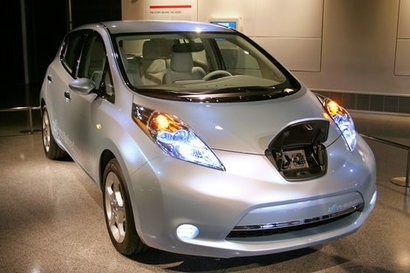
An innovative research project has won a £1.7 million share of a £38.2 million government prize aimed at ‘light weighting’ technology – applying the science behind F1 cars and space satellites to make passenger cars weight less and become more fuel efficient. The results could reduce the weight of steel components in vehicles such as the Nissan LEAF by more than half, potentially extending the distance a plug-in car can drive (its ‘range’) by up to 25 percent.
The project, initiated by a consortium including Jaguar Land Rover and Nissan, is one of more than 130 car manufacturers, technology companies and research centres across the UK to have won a share of the money, announced in the recent budget. This will create hi-tech jobs and help the UK to become a global leader in exporting state of the art, emission-cutting technology.
“Our £38 million investment will help Britain become a world leader in this exciting and valuable technology sector, creating skilled jobs of the future as part of our long-term economic plan” said UK Transport Minister Andrew Jones. “It will also mean lower running costs for motorists and less fuel consumption, which is good for the environment and our economy. This competition continues our £600 million commitment by 2020 to support the uptake of ultra-low emission vehicles, making journeys cheaper and greener, ensuring the nation is fit for the future.”
The winning projects were chosen following a competition launched last September (2015) encouraging companies to propose innovative ideas to cut vehicle emissions. The funding combines £30 million from the Office for Low Emission Vehicles (OLEV) with £8.2 million of additional funding from Innovate UK, who will support the schemes. They will begin unveiling working prototypes by 2018 and could feature in passenger cars from 2020.
Roland Meister, Head of Transport at Innovate UK, added that UK businesses have a great opportunity to be at the leading edge of the global drive to increase efficiency and reduce emissions from vehicles. The £38 million government support means that more than 130 innovative organisations right across the country now have the chance to get their ideas off the drawing board and potentially into the cars and trucks of the future, boosting the economy by at least £532 million in the process.
The OLEV research and development fund also includes funding for a range of other projects including: a project aiming to reduce the cost of electric vehicle (EV) batteries by using cheaper sodium-ion technology; a collaboration between Magnomatics Ltd and the University of Sheffield to develop a more efficient transmission system using magnets; projects involving testing of new fuel cells to extend the range of electric vans; a project seeking to apply greener dual-fuel technology to HGVs, and a project to develop thermal recovery kits that capture waste heat from vehicle exhaust and turn it into electricity.
For additional information:

